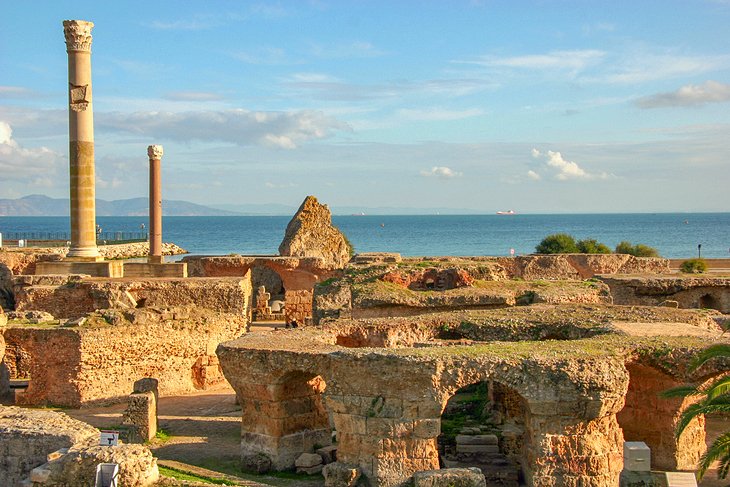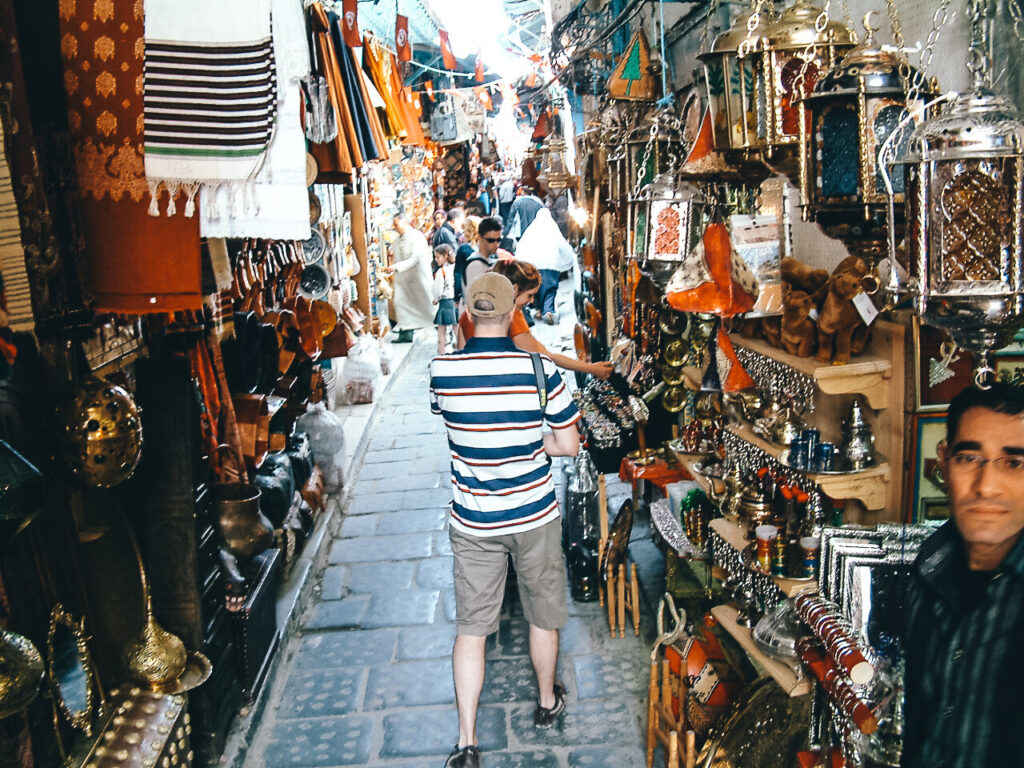Explore Tunisia Tourism: History, Beaches, and Culture
Estimated reading time: 8 minutes
Key Points
- Discover the rich history and Carthage ruins.
- Enjoy the beauty of Tunisia’s Mediterranean beaches.
- Explore the unique blend of Tunisian culture.
- Learn about distinctive cuisine and festivals.
- Essential notes when traveling to Tunisia.
Table of Contents
Tunisia, located between Algeria and Libya, is a captivating tourist destination in North Africa. It is famous for its rich history, beautiful Mediterranean beaches, and diverse culture with strong influences from Berber, Phoenician, Roman, Arab, and French traditions. If you are looking for a journey that combines exploring historical sites, enjoying green seas and white sands, and experiencing unique culture, this article is for you. Join me in discovering the destinations and cultural stories to prepare for the most complete Tunisia trip.
Tunisia History and Carthage Ruins
Tunisia is historically the homeland of the Amazigh (Berber) people since prehistoric times. This land was once the center of the legendary city of Carthage, a powerful Phoenician city-state on the Mediterranean Sea, famous for its commercial and naval power. However, Carthage was conquered by the Roman Empire – a turning point that brought about a strong transformation for Tunisia in ancient times.
Under Roman rule, Tunisia developed into an agricultural and commercial center, with impressive architectural works and infrastructure systems that remain today. Subsequently, Arab invasions brought Islam and new cultures, creating a unique blend. The Ottoman and French colonial periods also left profound marks, contributing to the vibrant multiculturalism of Tunisia today.
Must-Visit Carthage Ruins Destinations
- Carthage Ruins: Recognized as a UNESCO World Heritage site, this place stands out with remnants such as the Roman amphitheater, the Baths of Antoninus, and ancient villas. Each structure tells a story of alternating Phoenician, Punic, and Roman periods, helping visitors visualize over 2,000 years of history in this region.
- Medinas of Tunis and Sousse: These two old quarters are also preserved by UNESCO, featuring refined Islamic architecture along with bustling souks and ancient mosques. Exploring the medina is a wonderful opportunity to feel the blend of traditional life with modern influences in Tunisia.
- Sidi Bou Said: A charming small town famous for its distinctive blue and white architecture, along with a poetic Mediterranean sea view. This is a place often frequented by artists and writers, creating a romantic and culturally rich atmosphere.
- Tunisian Desert Region: The troglodyte homes of the Berber people or locations that appeared in *Star Wars* films offer a unique experience, connecting ancient history with modern popular culture.

Carthage ruins
These historical remnants and traditions are not just museums of the past but also profoundly influence the language, art, cuisine, and customs of Tunisians today. The terraced fields, unique architecture, or the way people live in harmony with nature are all testaments to the understanding and preservation of ancient heritage.
Tunisia Beaches with beautiful Mediterranean Sea
Tunisia boasts over 1,000 km of beautiful Mediterranean coastline, stretching with fine golden sands and clear blue waters. With its mild Mediterranean climate, Tunisian beaches are an ideal destination for those who love relaxation, water sports, and enjoying the fresh sea air.
Top Beach Destinations in Tunisia
- Hammamet: Although famous for its vibrant resorts and many water activities, Hammamet still retains its charm thanks to its long beaches and year-round festivals.
- Sousse: Combining historical heritage with beautiful sea views, this is a destination that attracts tourists who want to both visit the ancient medina and relax by the beach.
- Djerba: A peaceful island with poetic beaches, vibrant traditional markets, and distinctive Berber architecture, offering an experience of both lounging on the sand and immersing oneself in the cultural atmosphere.
- La Marsa: Located near the capital Tunis, La Marsa is attractive due to its high-end beach clubs and professional relaxation spaces.

La Marsa beach
Experiences at Tunisia’s Mediterranean Beaches
At the beaches, you can participate in many activities such as swimming, sunbathing, surfing, fishing with locals, or enjoying fresh seafood directly at coastal restaurants. Many resorts also offer high-end spa and wellness services for you to fully enjoy your vacation. If you wish, you can combine cultural visits or exciting desert trips just a short distance away.
Tunisian Culture: A Blend of Tradition and Modernity
Tunisia is a melting pot of diverse cultures – from the indigenous Berber beauty, the rich Arab influence, to the impact of Ottoman and French rule. From vibrant traditional markets like the souk to colorful festivals, Tunisian culture always captivates visitors.

Traditional Tunisian Cuisine and Dining Experience
Tunisian cuisine is famous for its flavorful dishes, rich in spices and natural ingredients. Some signature dishes you shouldn’t miss:
- Brik: A crispy fried pastry filled with egg and tuna, perfect when enjoyed with a cup of sweet tea.
- Couscous: Tunisia’s national dish made from steamed semolina grains, served with lamb, fish, or seasonal vegetables.
- Mlawi: A thin, crispy flatbread, often served with spicy dishes or soup.
- Harissa: A signature spicy chili paste, the soul of many dishes, and often served with bread or used as a condiment.

Tunisia Couscous
Meals often take place in a communal, lively style, from market stalls to cafes overlooking the sea, reflecting the emphasis on family and community values in Tunisian culture.
Tunisian Festivals: Unique Cultural Features Year-Round
Tunisia hosts many prominent art, music, dance, and food festivals throughout the year. These events not only celebrate tradition but also foster modern creativity, attracting tourists and locals alike to immerse themselves in the vibrant festival atmosphere.
Tunisia Travel Plan: Important Notes
To make your Tunisia trip smooth and memorable, please note the following information:
Best Time to Travel to Tunisia
The Mediterranean climate makes spring (March–May) and autumn (September–November) the ideal times for visiting historical sites, swimming, and engaging in outdoor activities. Summers can be very hot, especially in inland desert regions.
Transportation
Tunisia has a fairly developed road and rail network, so you can easily rent a car or join guided tours to explore further into remote areas.
Safety and Things to Know
Most tourist areas are considered safe; however, you should respect local customs, especially during religious festivals, and check for updated information before your trip.
Essential Information
- Language: Arabic is the official language; French is widely spoken in many areas.
- Currency: Tunisian Dinar (TND).
- Visa: Many nationalities are allowed visa-free entry or can obtain a visa upon arrival; check in advance to be fully prepared.
Conclusion: Why Tunisia Tourism is an Unmissable Experience
Tunisia is a rare destination offering a wonderful blend of ancient history, inviting Mediterranean beaches, and vibrant traditional culture. Whether you are passionate about exploring the Carthage ruins, enjoying the blue sea waters, or immersing yourself in colorful Tunisian festivals, this place will leave an indelible mark on your journey.
Experience and discover Tunisia for yourself – a precious gem of North Africa with heroic historical stories, a beautiful natural landscape, and a rich, distinctive cultural identity. Tunisia tourism will surely broaden your horizons and inspire those who love discovery and diverse cultures.
*Pack your bags and join me, NuhairaVoyage, on a magical journey to Tunisia – where history, sea, and culture intertwine in every moment.*
See also:
Explore Arab Festivals: Details of Unmissable Traditional Festivals

